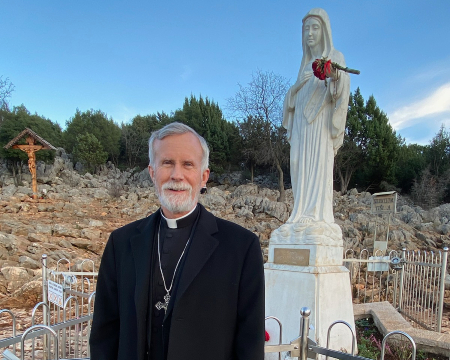 Hi readers, it seems you use Catholic Online a lot; that's great! It's a little awkward to ask, but we need your help. If you have already donated, we sincerely thank you. We're not salespeople, but we depend on donations averaging $14.76 and fewer than 1% of readers give. If you donate just $5.00, the price of your coffee, Catholic Online School could keep thriving. Thank you. Help Now >
Hi readers, it seems you use Catholic Online a lot; that's great! It's a little awkward to ask, but we need your help. If you have already donated, we sincerely thank you. We're not salespeople, but we depend on donations averaging $14.76 and fewer than 1% of readers give. If you donate just $5.00, the price of your coffee, Catholic Online School could keep thriving. Thank you. Help Now >
Viva Cristo Rey! The Happy Priest Reflects on the Solemnity of Corpus Christi
FREE Catholic Classes
Most of the time, we need constant reminders of the immense gifts that God continually bestows upon us. The Eucharist is an immense miracle, but sometimes we need to be reminded just how amazing this miracle really is.As we celebrate the Solemnity of Corpus Christi and call to mind the amazing example of Blessed José Luís Sanchez del Río, how can anyone purposely miss Mass on Sunday, receive communion in the state of mortal sin, or not go to Confession on a regular basis and whenever necessary? Viva Cristo Rey!
 Hi readers, it seems you use Catholic Online a lot; that's great! It's a little awkward to ask, but we need your help. If you have already donated, we sincerely thank you. We're not salespeople, but we depend on donations averaging $14.76 and fewer than 1% of readers give. If you donate just $5.00, the price of your coffee, Catholic Online School could keep thriving. Thank you. Help Now >
Hi readers, it seems you use Catholic Online a lot; that's great! It's a little awkward to ask, but we need your help. If you have already donated, we sincerely thank you. We're not salespeople, but we depend on donations averaging $14.76 and fewer than 1% of readers give. If you donate just $5.00, the price of your coffee, Catholic Online School could keep thriving. Thank you. Help Now >
Highlights
Catholic Online (https://www.catholic.org)
6/11/2012 (1 decade ago)
Published in Living Faith
Keywords: Sunday homily, catholic spirituality, Corpus Christi, Eucharist, Fr. James Farfaglia, John Paul II, Benedict XVI, Jose Luis Sanchez del Rio, Cristeros, For Greater Glory, Body and Blood of Christ
CORPUS CHRISTI, TX (Catholic Online) - Most of the time, we need constant reminders of the immense gifts that God continually bestows upon us. The Eucharist is an immense miracle, but sometimes we need to be reminded just how amazing this miracle really is.
One such reminder took place in 1263. A German priest, Peter of Prague, stopped at Bolsena, Italy while on a pilgrimage to Rome. He is described as being a pious priest, but one who found it difficult to believe in Transubstantiation.
While celebrating Mass at the tomb of Saint Christina, located in Bolsena, he had barely spoken the words of Consecration when blood started to seep from the consecrated Host and trickle over his hands onto the altar and the corporal.
The priest was immediately confused. At first he attempted to hide the blood, but then he interrupted the Mass and asked to be taken to the neighboring city of Orvieto, the city where Pope Urban IV was then residing.
The Pope listened to the priest's story and gave him absolution for his lack of faith. He then sent emissaries for an immediate investigation. When all the facts were ascertained, he ordered the Bishop of the diocese to bring to Orvieto the Host and the linen cloth bearing the stains of blood.
With archbishops, cardinals and other Church dignitaries in attendance, the Pope met the procession and, amid great pomp, had the relics placed in the cathedral. The linen corporal bearing the spots of blood is still reverently enshrined and exhibited in the Cathedral of Orvieto, Italy.
Pope Urban IV was prompted by this miracle to commission Saint Thomas Aquinas to compose the liturgical prayers in honor of the Eucharist. One year after the miracle, in August of 1264, Pope Urban IV introduced the saint's compositions, and by means of a papal bull instituted the feast of Corpus Christi.
The Feast of Corpus Christi reminds us that we possess an immense treasure.
When a Catholic priest takes a little piece of unleavened bread and repeats the words that Jesus spoke at the Last Supper, "This is my body," and when he takes a small of amount of wine in a chalice and says, "This is my blood," the bread is no longer bread and the wine is no longer wine.
At every Holy Sacrifice of the Mass, we participate in a marvelous miracle, the miracle called Transubstantiation.
Last week we reflected upon the mystery of communion. Our Triune God is a communion of persons. The Eucharist is called Holy Communion.
Jesus himself, through the Eucharist, grants to us the most powerful experience of intimacy possible within our earthly existence.
As Pope Benedict explains: "And that is what is really happening in Communion, that we allow ourselves to be drawn into him, into his inner communion, and are thus led finally into a state of inner resemblance" (God and the World, Joseph Ratzinger, p. 409).
What intimacy! When Jesus comes to us, he comes to us as communion. God and man become one. He comes to us as the divine lover. His communion with us is more intimate than the intimate union of husband and wife or a mother with her unborn child.
We cannot even begin to fathom the depth of God's love for us.
His love is so immense that he himself is defined as love. "God is love" (1 John 4: 8, 16).
The Holy Eucharist is the most visible sign of God's love for each of us. Jesus loves us so much that he cannot leave us. "And know that I am with you always until the end of time" (Matthew 28: 20).
Let us recall the words from the first encyclical letter written by Blessed Pope John Paul II, "Man cannot live without love. He remains a being that is incomprehensible for himself, his life is senseless, if love is not revealed to him, if he does not encounter love, if he does not experience it and make it his own, if he does not participate intimately in it" (Redemptor Hominis, 10.1).
As we consider the mystery of God's unconditional love we are reminded that love defines the very purpose of our existence too. The purpose of our life can be summed up with only one word: love: "since God has loved us so much, we too should love one another" (1 John 4: 11).
The human person cannot live without the experience of divine love and human love. The human person cannot live without the experience of divine intimacy and human intimacy. The human person cannot live without communion.
Man becomes fully realized in communion because he is created for communion by a God who is the most perfect communion.
The experience of God's love has allowed the saints of the Catholic Church to do heroic acts of courage and love. One example is that of the martyrdom of a young Mexican teenager by the name of José Luís Sanchez del Río. His story is beautifully portrayed in the inspirational new movie, "For Greater Glory."
Historically, José Luís was born in Sahuayo, Michoacán on March 28, 1913.
When the Cristero war began in 1926 as a popular uprising in response to the severe persecution of President Plutarco Calles against the Catholic Church, his brothers joined the rebellion. His mother would not allow José Luís to follow his brothers, but she eventually relented when he was thirteen years old. As depicted in the movie, José was the flag bearer for one of the Cristero troops.
During a heavy battle, young José Luís was captured by Federal soldiers. He was imprisoned, severely tortured and eventually executed.
The soon to be martyr was brutally tortured by a soldier cutting the skin off of the bottom of his feet and then he was made to walk barefoot to his grave. What is dramatically shown in the movie is historical.
The Federal soldiers wanted the young Cristero to renounce his Catholic faith, but he valiantly refused. "If you shout, death to Christ the King, we will spare your life." José would only shout, "I will never give in. Viva Cristo Rey!"
When they arrived at the place where he was going to be killed, federal soldiers stabbed him numerous times with bayonets. The commander was so angry that he pulled out his pistol and shot the young Cristero.
Moments before his death, the boy was able to draw a cross in the dirt and kissed it.
José Luís Sanchez del Río was martyred on February 10, 1928. He was beatified on November 20, 2005. The body of the young Cristero martyr rests at Sacred Heart of Jesus Catholic Church in Sahuayo, Mexico.
As we celebrate the Solemnity of Corpus Christi and call to mind the amazing example of Blessed José Luís Sanchez del Río, how can anyone purposely miss Mass on Sunday, receive communion in the state of mortal sin, or not go to Confession on a regular basis and whenever necessary? Viva Cristo Rey!
-----
Father James Farfaglia is the Pastor of Our Lady of Guadalupe Catholic Church in Corpus Christi, TX. Visit him on the web to learn more about his book Get Serious - A Survival Guide for Serious Catholics which is now on sale at $9.95 per copy. Special price for bulk orders are available.
---
'Help Give every Student and Teacher FREE resources for a world-class Moral Catholic Education'
Copyright 2021 - Distributed by Catholic Online
We ask you, humbly: don't scroll away.
Hi readers, it seems you use Catholic Online a lot; that's great! It's a little awkward to ask, but we need your help. If you have already donated, we sincerely thank you. We're not salespeople, but we depend on donations averaging $14.76 and fewer than 1% of readers give. If you donate just $5.00, the price of your coffee, Catholic Online School could keep thriving. Thank you.Help Now >









 Daily Readings for Saturday, April 20, 2024
Daily Readings for Saturday, April 20, 2024 St. Marian: Saint of the Day for Saturday, April 20, 2024
St. Marian: Saint of the Day for Saturday, April 20, 2024 Children's Prayer For Parents: Prayer of the Day for Saturday, April 20, 2024
Children's Prayer For Parents: Prayer of the Day for Saturday, April 20, 2024


